Four 3 TB Hard Drives, Tested And Reviewed
Hard drives able to hold 3 TB of data need to be considered carefully because they might not always work as expected. This round-up of four high-capacity disks compares products from Hitachi, Seagate, and Western Digital, then covers their caveats.
Hitachi Deskstar 5K3000 (HDS5C3030ALA630) And Deskstar 7K3000 (HDS723030ALA640)
Hard drives that try to emphasize low power consumption purposely avoid drawing your attention to their spindle speed. This applies to Hitachi's Deskstar 5K3000 as well. Instead, the manufacturer touts the benefits of its CoolSpin feature that employs a rotational speed said to maximize performance, power consumption, and operating noise. Because the drive is purportedly optimized for power, it most likely employs a single speed somewhere between 5400 and 6000 RPM.
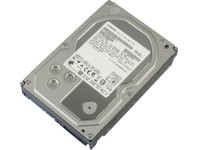
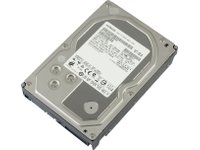
Compared to the Hitachi Deskstar 7K3000 (a much more performance-oriented hard drive with its 7200 RPM spindle speed), the Deskstar 5K3000 requires up to 29% less power as a result of its CoolSpin technology. You can tell the difference just by looking at each disk's data sheet. The 5K3000's active idle is rated at 5.1 W, while the 7K3000 is rated at 7.3 W. Both of these top-of-the-line models use five platters, and they have a areal density of 411 Gb per square inch.
Other than the 3 TB version (HDS5C3030ALA630), the Hitachi Deskstar 5K3000 is also available in capacities of 2 TB (HDS5C3020ALA632) and 1.5 TB (HDS5C3015ALA632). The same goes for the Deskstar 7K3000 series: the 3 TB flagship (HDS723030ALA640) is followed by a 2 TB version (HDS723020BLA642) and a 1.5 TB model (HDS723015BLA642).
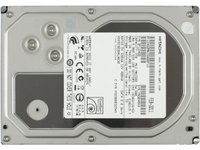
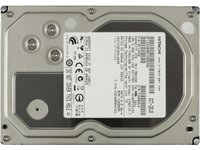
The Deskstar 5K3000 drives use a 32 MB cache and a 6 Gb/s Serial ATA interface, while the Deskstar 7K3000 comes with a larger 64 MB cache. Otherwise, the technical details separating the two only differ slightly. Specs like platters used, weight, and temperature (around 5°C) are where you'll notice them.
Performance
The different foci of the two Hitachi hard drives is reflected in their performance. The Deskstar 5K3000 has an average data read speed of 97 MB/s, while the Deskstar 7K3000 is clearly faster at 118 MB/s average throughput. The same goes for the access times: 6.1 ms for the Deskstar 7K3000 compared to 7.7 ms for the Deskstar 5K3000.
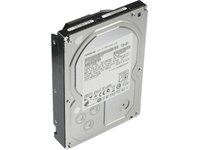
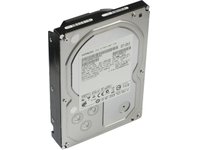
As with the other hard drives in this round-up, the two Hitachi drives are ideal solutions for capacity-heavy applications. The Deskstar 7K3000 is a bit faster due to its higher rotational speed and larger cache, but none of the hard drives in the test were really designed for environments with high I/O loads. For users building large storage arrays, our recommendation is (perhaps surprisingly) the Deskstar 5K3000, as it easily beats the faster 7K3000 when it comes to performance per watt.
Get Tom's Hardware's best news and in-depth reviews, straight to your inbox.
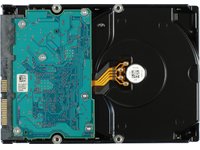
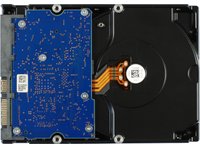
Current page: Hitachi Deskstar 5K3000 (HDS5C3030ALA630) And Deskstar 7K3000 (HDS723030ALA640)
Prev Page Who Sells The Best 3 TB Hard Drive? Next Page Seagate Barracuda XT (ST33000651AS)-
agnickolov ReplyThree terabyte hard drives remain premium products, not only because they're best handled by enthusiasts who know what they're doing, but also because they're the largest disks available and you always seem to pay more for the largest, fastest, coolest...well, you know the drill.
Well, that's no longer the case:
http://www.tomshardware.com/news/GoFlex-Desk-4TB-3.5-inch-industrial-design-USB-3.0,13371.html
-
vdr369 Seagate barracuda is pulling my heart with it's performance, but punching my pocket with it's price,Reply -
salb99 the hitachi 5k3000 at max throughput uses less power than at idle, is it correct? also, video power consumptions here are the same as idle for all drives.Reply -
dww I don't see the point of 3 TB drives. Too big to use in most current systems, but too small to be a useful gain over 2 TB for those that CAN handle larger sizes. At present they're also too expensive, and once 4 TB drives come out in volume they'll be superseded. So I guess they're just a short term stopgap.Reply -
excidium Graph labels for the 7K3000 are incorrect ( 5400RPM ) on page:Reply
Benchmark Results: Throughput And Interface Bandwidth
Haven't finished reading the rest of the article. -
WD30EZRS recommended for NAS?Reply
how about TLER ? and the issue with frequent head parking ? Though the later is correctable with wdidle3.exe..
Considering each green drive might have different rotation speed are you sure about your NAS recommendation? -
monkeysweat i know 2TB is cheaper per GB,, however i only got 4 HDD slots in my case,, and 3 are in use already,, 1.5, 2.0 & 2.5 TB model drives + 1 SSD tucked under my card reader,, either i gotta spend more on a new case + drive or just spend a little more on a nice drive...Reply -
chesteracorgi With 2 Samsung 2.0 TB F4 Ecogreen (SATA 3.0 & 32 MB cache) and 2 1.5 TB Seagate Barracuda Green (SATA 6.0 & 64 MB cache) drives installed in my home server, it is my experience that HDDs are no better off on SATA 6.0 than on SATA 3.0. If you are looking for performance then look for a faster rpm rate: the 640 GB WD Caviar Black (SATA 6.0 & 64 MB cache) kills all of the above in speed. However, none of these HDDs can touch an older generation SSD like the Crucial C300 (128 GB).Reply
The most important characteristic of the HDDs is reliability. So far, since 3/11, all of the HDDs have proven reliable, while the SSD had to be RMA'd after a couple of weeks.
But the story is not complete on any of this hardware as it is still premature to talk about long term results. I believe that reliability is the biggest issue with 3 TB drives and would like to see more on failure rates and reliability.
BTW the average feedback at Newegg on large HDDs is about 60% positive (4 or 5 eggs) on large drives. I made a decision to buy only drives with a rating of at least 80% aggregate positive.